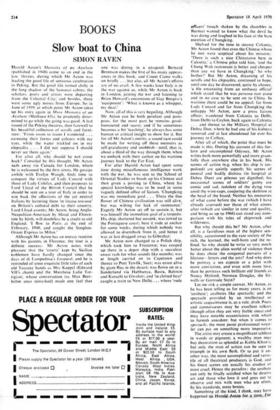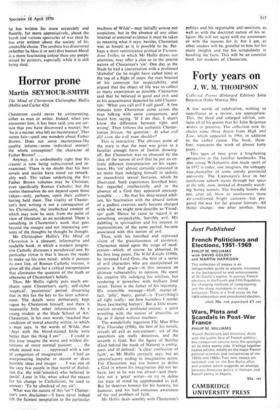BOOKS Slow boat to China
SIMON RAVEN
'Harold Acton's Memoirs of an Aesthete (published in 1948) come to an end in the late 'thirties, during which Mr Acton was leading the good life of sensuous cerebration in Peking. But the good life turned chilly in the long shadow of the Samurai sabres; the scholars, poets and artists were departing from the Celestial City; and besides, there were some ugly noises from Europe. So in June of 1939, at which point Mr Acton takes up his story again in More Memoirs of an Aesthete (Methuen 65s), he prudently deter- mined to go while the going was good. A last round of the Peking theatres, then farewell to his beautiful collection of scrolls and furni- ture: 'From room to room I wandered . . . caressing their forms and colours with my eyes, while the water trickled on in my clepsydra . . . I did not suppose I should never see them again.'
For after all, why should he not come back? Consoled by this thought, Mr Acton sails away via Canada for London, where he is welcomed by the first sirens. He gossips awhile with Evelyn Waugh, finds time to compare the virtues of Lady Cunard with those of Lady Colefax, and then proposes to Lord Lloyd of the British Council that he should be sent on a tour of Italy in order to win back the affections of the yet neutral Italians by lecturing them 'in lingua toscana' on Britain's cultural debt to their country. Lord Lloyd assents; Mr Acton. being Anglo- Neapolitan-American by blood and Floren- tine by birth, will doubtless be a credit to old England. 'I flew to Paris at the end of February, 1940, and caught the Simplon- Orient Express to Milan.'
Although Mr Acton has an uneasy reunion with his parents in Florence, the tour is a definite success: Mr Acton notes with pleasure that the 'courts' kept by Sicilian noblemen have hardly changed since the days of di Lampedusa's Leopard; and he is reminded of some exquisite little tales of such old Tuscany hands as Mrs Keppel (Edward VIl's chum) and the Marchesa Lulie Tor- rigiani, whose conversation (as Max Beer- bohm once remarked) made one feel that one was dining in a cesspool. Bernard Berenson makes the first of his many appear- ances in this book, and Count Ciano walks on briefly ... but alas, all Mr Acton's efforts are of no avail. A few weeks later Italy is in the war against us, while Mr Acton is back in London, joining the RAF and listening to Brian Howard's encomium of Guy Burgess's 'equipment': 'What is known as a whopper, my dear.'
Now, all of this is very beguiling. Although Mr Atton can be both petulant and pom- pous, for the most part he remains good- humoured and suave; and if he sometimes becomes a bit 'teaching', he always has some human or critical insight to show for it. But for all Mr Acton's merits, a sound case could be made for writing off these memoirs as self-gratulatory and snobbish—until, that is, about a third of the way through them, when we embark with their author on his wartime journey back to the Far East.
For after Harold Acton -had spent some- time doing miscellaneous intelligence work with the RAF, he was sent to the School of Oriental Studies to brush up his Chinese and then given a posting to China, where his special knowledge was to be used in some vaguely defined office of liaison. 'Chungking was my immediate goal . . . There the fine flower of Chinese civilisation was still alive, but was wilting for lack of sustenance.' Eagerly Mr Acton set off to sustain it, but was himself the immediate goal of a torpedo. His ship, shattered but unsunk, was towed to the Portuguese coast; here it rode at anchor for some weeks, during which nobody was allowed to disembark from it, and hence it was at last dragged away to Gibraltar.
Mr Acton now changed to a Polish ship, which took him to Freetown; was cooped up there in a depot ship with a succulent sweat rash for what sounds like months; was at length carried on to Capetown and thence to Port Tewfik, Suez; was eaten alive by giant flies in the desert; was flown on in a Sunderland via Habbanya, Basra, Bahrein and Karachi to Gwalior; and 'in clotted heat' caught a train to New Delhi ... where 'rude officers' (much shaken by the shambles in Burma) wanted to know what the devil he was doing and laughed in his face at the bare mention of Chungking.
Shelved for the time in steamy Calcutta, Mr Acton found that even the Chinese whom he met were sceptical about his mission : 'There is such a nice Chinatown here in Calcutta.' a Chinese pilot told him, 'and the Chung Wah restaurant is better and cheaper than any we have in Chungking.' So why bother? But Mr Acton, dreaming of his scrolls and his clepsydra, continued to hope, until one day he discovered, quite by chance, 'a file emanating from an embassy official' which stated that he was persona non grata and in no case to be sent on to China. In wartime there could be no appeal; far from Lady Cunard and far from Chungking the unhappy Mr Acton, now a press liaison officer, wandered from Calcutta to Delhi, from Delhi to Ceylon, back again to Calcutta . . . and thence to the Military Hospital at Dehra Dun, where he had one of his kidneys removed and at last abandoned for ever his journey to Cathay.
After all of which, the point that must be made is this. During his account of this for- lorn and uncompleted Odyssey, Mr Acton writes both more powerfully and more grace- fully than anywhere else in his book. His scenes of action (e.g. when his ship is tor- pedoed) are quietly superb; his scenes of mental and bodily distress (in hospital at Dehra Dun) are piteous yet dignified; his occasional scenes of soldiers' gaiety are comic and sad, redolent of the dying rose amid the wine-cups, conjuring the skeleton at the head of the board. Neither his memories of what came before the war (which I have already assessed) nor those of what comes after (which are similar in tone and quality, and bring us up to 1966) can stand any com- parison with his tales of shipwreck and wilderness.
But why should this be? Mr Acton, after all, is a fastidious man of the highest sen- sibility, accustomed to the rare society of the rich, the learned, the well-born and the re- fined. So why should he write so very much better about the alien world of violence than he does about the congenial pursuits of a lifetime—letters and the arts? And why does he portray a sea captain or a pilot with more conviction, and even with more love, than he portrays such brilliant old friends as Nancy M itford, Norman Douglas. the Sit- wells' or Gertrude Stein?
Let me risk a simple answer. Mr Acton, as he has been telling us for many years, is an 'aesthete'; aesthetes like spectacle; and the spectacle provided by an intellectual or artistic acquaintance is, as a rule, drab. Poets and connoisseurs may be excellent talkers (though often they are very feeble ones) and may have notable eccentricities with which to furnish anecdote: but when it 'comes to spectacle, the most passé professional wrest- ler can put on something more impressive.
The artist may create a magnificent tableau in words or pigment; a wealthy man may buy decoration as splendid as Kubla Khan's; but only the man of action can be seen to triumph in his own flesh. Or to put it an- other way, the most accomplished and versa- tile of all theatrical producers is God, and his finest scenes are usually his crudest or most cruel. Hence the paradox : the aesthete can only be finally satisfied when he deserts art and those who love it and goes out to observe and 'mix with men who are often, by his standards, mere brutes. Something of the kind, I think, may have happened to Harold.Acton for atime. For he has written far more accurately and fluently, far more appreciatively, about the harsh and various spectacles of war than he has ever written about the society of his ostensible choice. The aesthete has discovered (whether he likes it or not) that human blood is a more fascinating colour than any purple mixed by painters, especially while it is still being shed.







































 Previous page
Previous page